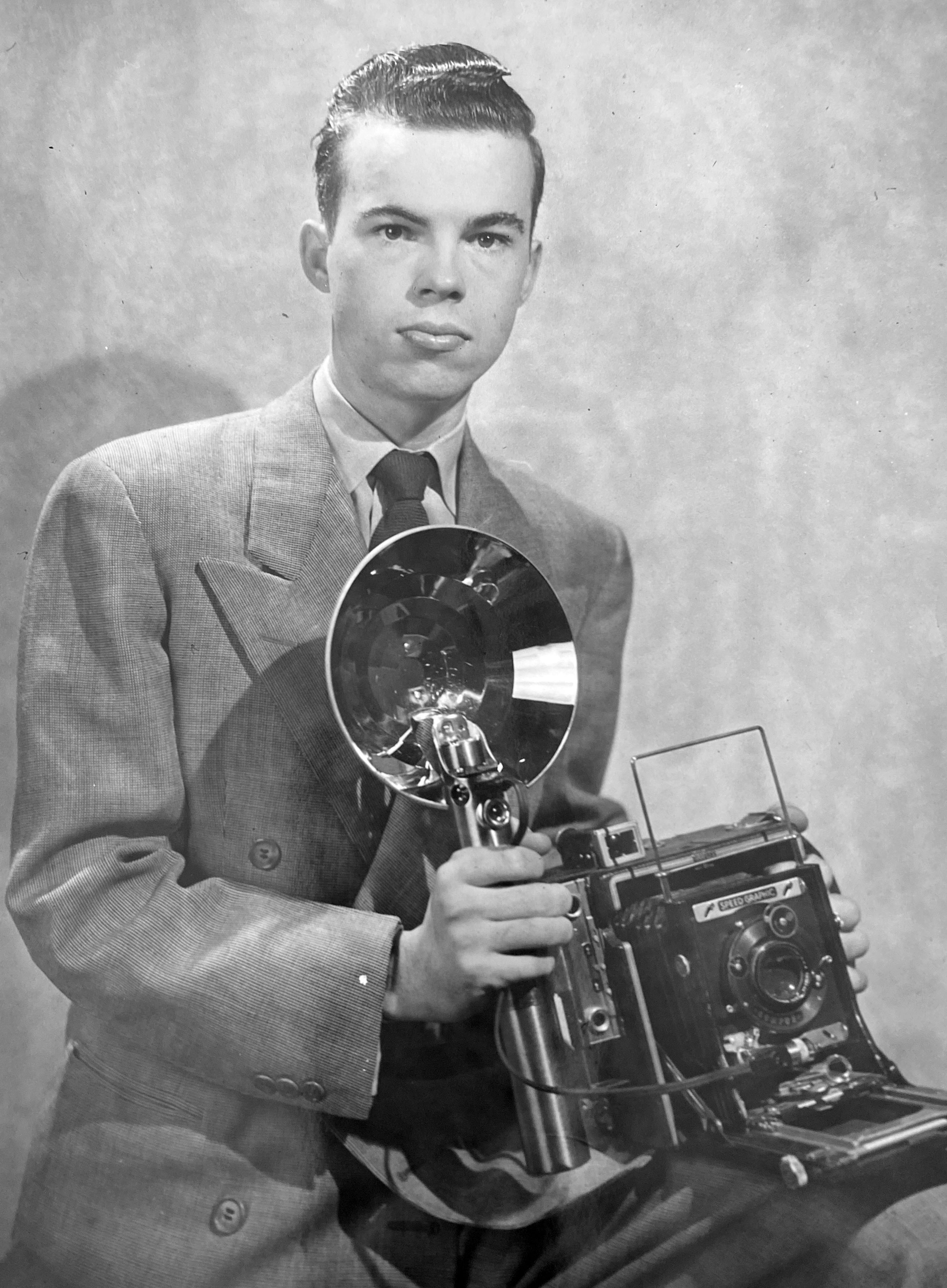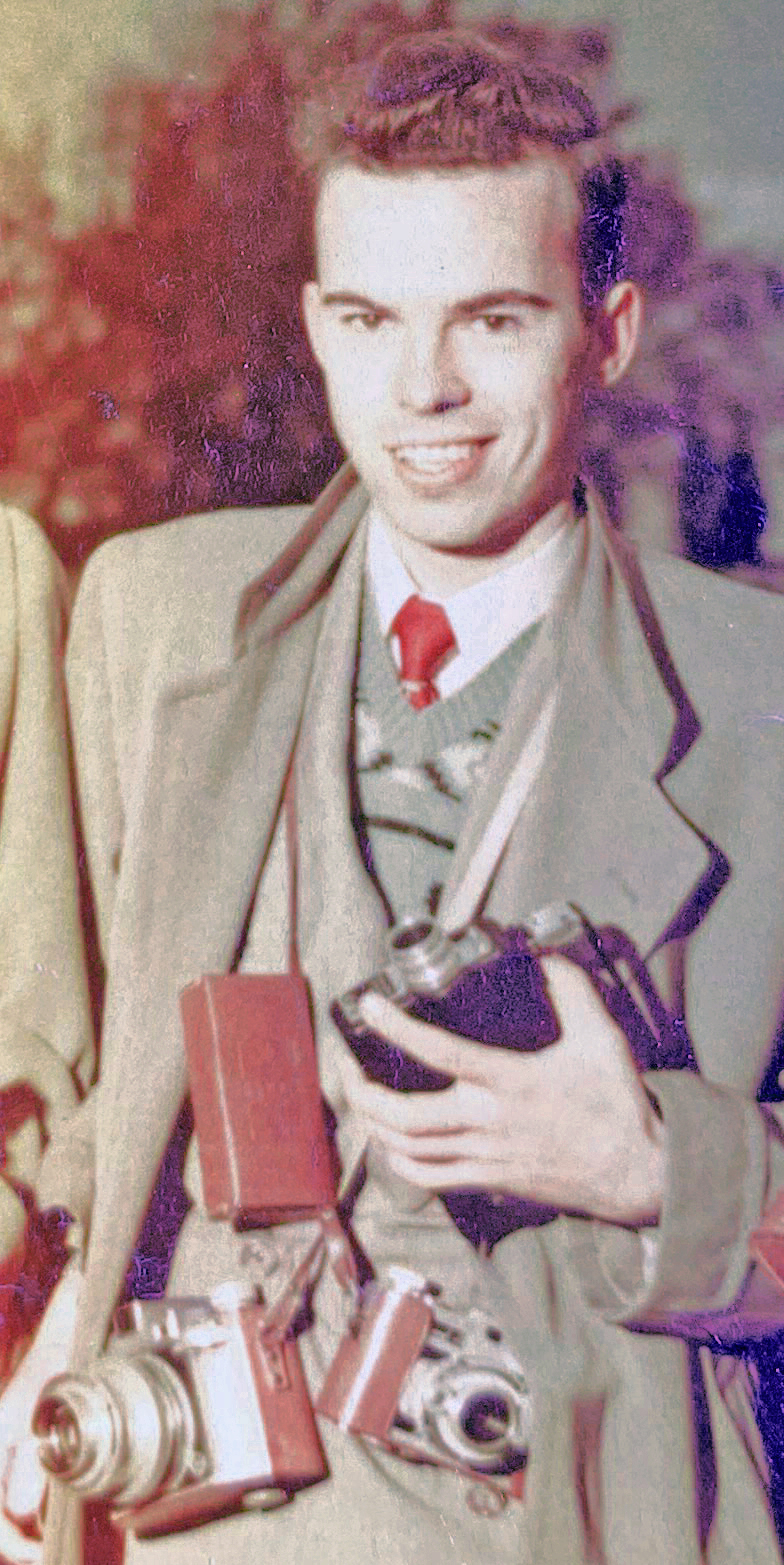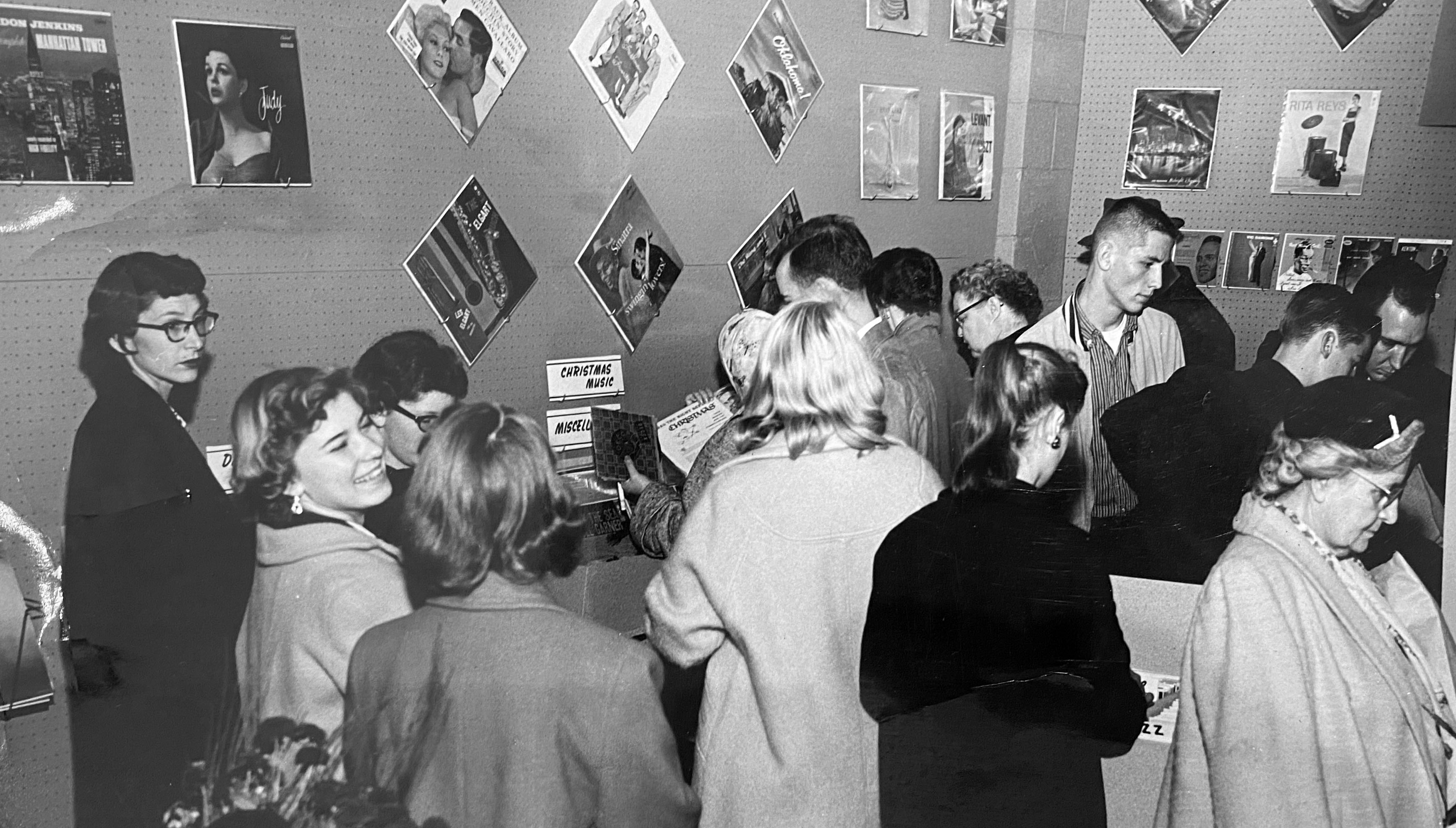Joe Jordan almost didn’t get the chance to become an innovative businessman who established Springfield’s first dedicated record store and pioneered the rental of television sets and other home appliances and furnishings.
Seventy-seven years before he died at age 92 on July 21, Joe narrowly escaped death in a horrific traffic tragedy.
Joe was 15 in October 1945 as he and more than a dozen other Springfield teens were returning from a weekend DeMolay outing when their truck collided with a car on U.S. 65 between Ozark and Springfield. Two 17-year-olds were killed, and 11 other boys were hospitalized — Joe among them, requiring a lengthy recovery from head injuries and a broken leg.
Once back on his feet, Joe and Greenwood Lab School classmate Elmer Anderson built a darkroom in the Jordan home and began honing photography skills that they later put to good use as energetic young entrepreneurs. One of their first ventures was to snap photos of couples attending events at the popular Half-a-Hill dinner and dance venue, quickly process the film and make prints, then rush back to the club and sell the photographs.

As a student at then-Southwest Missouri State College (now MSU), Joe was a staff photographer for the student newspaper, The Southwest Standard, and the Ozarko yearbook. He was a member of the first pledge class of the Sigma Pi fraternity when it was chartered on the Springfield campus, and in his senior year, he served as president of the SMS Inter-Fraternity Council.
Joe and Elmer were featured in a Springfield Leader & Press story about the Missouri-Kansas Bowl, a post-season football game held in Kansas City in December 1948 that pitted SMS against Emporia State. The newspaper noted that while many students were riding special buses to the game, Joe and Elmer were among some who planned to drive themselves — provided they could get Elmer’s Hudson automobile roadworthy.
“Elmer Anderson and Joe Jordan have been working hard and furiously at tearing apart the car and putting it back together,” the story read. “It is quite a sight to see the boys working away in Elmer’s garage with a kerosene heater for warmth and a dozen tin cans spread around with auto parts in them.”
The reporter noted that SMS classmate Don Burrell (who went on to a distinguished judicial career and is the namesake of Burrell Behavioral Health) was helping Joe and Elmer “by sitting in the car and every so often calling out ‘How are you coming, boys?’ No doubt this spurs them on to greater effort.”
(The Hudson and the boys made it to Kansas City, but SMS lost the game 34-20.)
The beginning of a career full of electronics
The next summer, Joe was hired on as the official photographer for the Ozark Empire Fair, and he captured a dramatic photo of a tumbling racecar in a crash on the fairground’s half-mile dirt track during a feature event that drew 7,000 spectators. The photo was initially published in the Leader & Press and was shared by the Associated Press, eventually appearing in newspapers around the country, including the New York Times.
Joe and Elmer served in the Air Force following college and then partnered as Anderson-Jordan Photography, setting up shop on the northwest corner of Glenstone Avenue and Bennett Street. Joe used his camera as a freelance journalist, selling photos to newspapers and magazines locally and elsewhere.

When Springfield’s first TV stations, KTTS-TV (now KOLR) and KYTV, went on air in 1953, Joe provided news photos and eventually film of news events to the fledgling operations. When a riot broke out at the Medical Center for Federal Prisoners here in 1959, Joe was one of the first photojournalists allowed inside after the uprising was quelled and five guards who had been taken hostage were rescued.
“He got some good photographs inside the prison that were syndicated nationally,” says son Chris, the eldest of Joe’s three children. “He received royalties from those.”
Joe also got into producing photos and film for print and TV ads for other businesses. An early customer was David Leong when he and brother Gee opened the original Leong’s Tea House restaurant on West Sunshine. It sparked a lifelong friendship — and a love for cashew chicken.
Chris and his sisters, Joann Hosmer and Cindy Weinstein, recall their dad as being hard-working but modest about his accomplishments, with a relentlessly optimistic attitude.
“He didn’t like things to get ruffled. He wanted to keep the calm,” says Joann. “He’d tell me during the last few years with everything going on in politics: ‘It’s going to be OK. We’ve been through this before. I’ve seen it all. It’s going to work out.’”
“The only exception,” notes Cindy, “was that he did say that COVID was like nothing he’d ever seen before.”
Joe was “super polite — I never heard him say a curse word,” says Cindy. Her sister emphasizes that he “never bragged about anything, ever.” Chris agrees: “He was not flamboyant at all. He was very matter-of-fact about things. He got along with people — with everybody — very, very well.”
Joann says Joe and their mother, Dorothy, who died in 2020 after 62 years of marriage, “were very serious about voting. They never missed an election, and they took us with them to the polls. I knew my dad was pretty much a Republican, but I never heard him say anything bad about the Democrats. He didn’t color me one way or another — I was free to make up my own mind.”
A Springfield record shop is born

Another thing that Joe was serious about was business — although throughout his career he remained flexible and open to new ideas.
As a strip mall took shape around the photography business building at Glenstone and Bennett in the 1950s, Chris says that Joe also began selling some electronic components, including speakers and phonographs, and a few record albums. However, those items were relegated to the back of the store.
“Mostly the records he sold were albums of symphony orchestras, very upscale stuff,” says Chris. “Then, one day, someone suggested that he put records in the front part of the store. He told my dad, ‘You should sell rock ‘n’ roll records.’ My dad said, ‘What’s that? Who are the artists?’ The friend said, ‘Oh, there’s this guy named Elvis Presley, this guy named Buddy Holly, this guy named Chuck Berry…’”
Joe had another question: Who would buy such records? “At the time, teenagers and young adults were not considered people you could market to,” says Chris, “because the thought was that they didn’t have any money to spend. But Dad thought, ‘Well, I have some empty display space…’ and so he went ahead and bought a couple of cases of records, just to see if anybody would buy them.”
The records — mostly 45-rpm singles with current pop hits — sold out within the week. “So he bought a few more cases, and they moved very, very quickly, too. He did it again and again, and it became lucrative because he was the only person in town doing that,” according to Chris.
Thus what had been Anderson-Jordan Photography became The Record Shop.
“From working in advertising, he knew people at the radio stations, so he started asking the disc jockeys what songs were popular,” Chris continues. “They told him what music was most requested by listeners to be played on the air, and he’d buy cases of records by those people that the disc jockeys said were hot.”
Customers crowded the store. It turned out that teenagers and young adults did have expendable income. That included Joe’s daughters, who say they usually had to buy their own records, just like anyone else.
By the way, Chris says, “My dad had no real interest in music himself. He knew business. He knew marketing, advertising, what customers did and didn’t do, what customers liked and what they would not tolerate. He had good instincts that way.”
Eventually, Joe became the exclusive dealer for a major phonograph, radio and television manufacturer of the day, Magnavox. When Battlefield Mall opened in 1970, Joe helped establish Colony Magnavox there.
The creation of Tel-A-Rent
When major national retailers built large stores here and began selling records as loss-leaders to lure customers, the Record Shop morphed into Video One and was able to soldier on selling TVs and VCRs for a while because unlike big-box stores, it had a service department to repair sets when they went on the blink.
“But my dad said that television sets were a rare product that got cheaper in price at the same time that they got better in quality every year,” says Chris. ”Eventually, TV sets became so inexpensive that it cost more money to fix them than it did to throw them away and buy new ones.”
About this time (late 1970s, early ’80s), Joe and business partner Mike Pierce had another inspiration: renting TVs.
“Interest rates were high; nobody wanted to do financing,” Chris explains. So when a customer one day wanted a TV set but couldn't afford to buy it, she was asked: If you could rent this television, would you take it? She did, and the rental business took off.
Chris says his father told him skeptics warned that people would damage or pawn the TVs. ”But there was a huge market of people who couldn’t get credit but who wanted nice things for their home.”
Thus Tel-A-Rent was established, and is still operated today by Pierce. Joe retired in 1992 but retained ownership of the building.
Joe’s kids recall a couple of their father’s practical business quirks:
“He didn’t pay his employees on Friday like a lot of businesses did,” says Chris. “He paid them on Monday. That was because he worried that if he paid them on Friday, they’d blow a lot of it over the weekend and then they wouldn’t have money for the week ahead. But if he paid them on Monday, at least they’d have a better of chance of having the money they needed to get through the week.”
Cindy and Joann say their dad didn’t eat lunch. “At the store, his salesmen would go out to lunch. But he’d stay because he knew customers would come in on their own lunch breaks. He’d make all the sales himself during the lunch hour, and didn’t have to pay commissions on them.”
Joe did like food, however. He always ate a big breakfast and a big supper when he’d finally get home at night after a long workday at the store. His parents, Charles and Minnie, had worked at the Union Stockyards, where his mom ran the cafe there for years — and Joe used some of her recipes to make tasty batches of chili, and beans and cornbread, and T-bone steak.
In his latter years, Joann took Joe out to eat almost every Monday evening, usually to Jimm’s Steakhouse, where, in a holdover from jaw injuries suffered in that long-ago traffic crash, he favored the easy-to-chew meatloaf. Other regular haunts included Mexican Villa (the Chico Mexican plate), Pizza House (mushroom and sausage pizza), and Leong’s (cashew chicken, of course).
He also enjoyed cars, often buying a new one annually during his working years. As a retirement gift to himself, he purchased a new Cadillac.
Joe, along with Dorothy, stayed busy with volunteer work, including operating the snack bar at the Landers Theater during Springfield Little Theater productions. They also served on the SLT and the Springfield Symphony boards.
And they continued a tradition they’d begun together back in the 1950s: Supporting the Missouri State Bears athletic teams. The couple regularly attended home basketball and football games, and traveled to games as far away as Arizona and California.
Someone who witnessed their faithful attendance at Bears basketball games is Sally Lyons McAlear:
“I became acquainted with Joe in the fall of 1983 when I started going to the men’s Bears basketball games before we were married. John’s seats were beside theirs, and I always sat beside Dorothy. There was probably no greater Bears fan than Joe!
“I was impressed that he always dropped Dorothy off at the door before the games and picked her up there afterward, not minding the time it took or traffic congestion involved.
“We also enjoyed their company away from games, meeting them for dinner and attending their annual New Year’s Day party. Joe was known for his excellent chili! He was a jovial host and always friendly to everyone.
“We will always cherish those memories.”
Chris, Cindy and Joann cherish their memories as well.
“We were so fortunate that he lived so long, because it gave us time with him in his later years that we didn’t always get in earlier years when he was working 9-to-9 at the store,” says Joann.
“If he hadn’t lived to 92 and stayed in remarkably good health, we would’ve missed the recent good times with him. Of course, if he’d lived to 102, it wouldn’t be long enough.”


